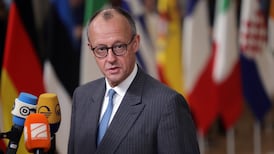After 12 years with Mark Rutte at the helm as prime minister, the Netherlands is set for a radical transformation of its political landscape after his fourth consecutive coalition collapsed on Friday in a bitter row over how to control surging immigration.
The unknown element in the general election after the summer will be the “farmer-civilian protest party”, known as BBB (Boer Burger Beweging), who swept all before it in regional elections in March but who remain untested on the national stage.
Polling by Ipsos just days before Friday’s collapse suggested that were a general election to be held immediately Mr Rutte’s Liberals (VVD) would remain the largest party in parliament with 28 of the 150 seats – while the BBB would rocket from its current single seat to at least 23, becoming the second largest.
Those figures illustrate the quandary facing potential coalition partners as they resign themselves to an election nobody wants: that while Mark Rutte conceded immediately on Friday evening that he would consider a fifth run for PM, the BBB has ruled out serving in any new government he leads.
READ MORE
The irony is that on the issue of immigration the Liberals and BBB are well matched: both favour considerably tougher immigration controls for asylum seekers.
The BBB proposes an annual cap of around 15,000 a year on the grounds that – with a population of more than 17 million in an area roughly the size of Minster – “the Netherlands is simply full”.
It’s a hugely popular platform that in a straight race could steal the Liberals’ thunder.
Rutte (56) has long been regarded as among the ablest politicians in office, but this stand-off is already feeding into a view that he overplayed his hand in the immigration row last week by demanding tougher restrictions – and that his dominance may finally be at an end.
Right-wing Freedom Party leader Geert Wilders – widely regarded as Rutte’s political nemesis – summed it up in a tweet as the wounded prime minister left for the palace to hand his resignation to King Willem-Alexander. “Adieu Rutte”, it said.
Rutte’s Liberals are not the only ones whose prospects have been damaged. If Ipsos is correct the big winners of 2021, centrist D66, led by former diplomat Sigrid Kaag, may become the big losers of 2023, plunging from its current 24 seats to nine, punished for its moderate views on asylum seekers.
The Christian Democrats are also expected to lose seats, with only the smallest coalition party, the conservative Christian Union, who rejected Mr Rutte’s immigration curbs as “anti-family”, remaining stable on four.
The spark for Friday’s collapse was a proposal from Mr Rutte to introduce a “two-status” streaming system for asylum seekers, where those with A status would be allowed permanent residence and those with B status would be allowed temporary residence. The fatal disagreement was over his tough restrictions on allowing those with B status to bring family members to the Netherlands to be reunited.
Applications for asylum in the Netherlands rose by one-third last year to over 46,000, and are expected to top 70,000 this year.














